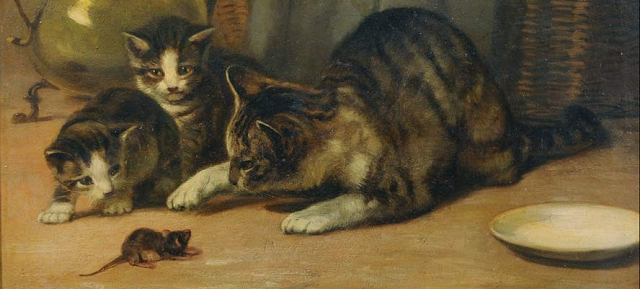The war between cats and mice just took a chilling turn, as a team of Russian researchers announces that early exposure to a chemical in cat urine can condition mice not to flee from an approaching cat. This can’t end well for the mice.
Cat urine contains a chemical compound called L-Felinine, and mice have evolved to react to it. When mice smell L-Felinine, their bodies produce a stress hormone called corticosterone, and they flee from the cat.
According to researchers, a good whiff of L-Felinine can even trigger hormonal reactions that can keep female mice from reproducing at all, or cause them to have smaller litters than usual. That kind of reaction isn’t unique to mice. Many prey species won’t reproduce, or will hold off on giving birth, if they know there’s a predator nearby.
The Experiment
But when mice grew up with the smell of cat urine, they don’t run away, according to lead researcher Vera Voznessenskaya and her colleagues, who presented their findings at the annual conference of the Society for Experimental Biology in Prague earlier this week.
The researchers exposed mice to the scents of cat urine and pure L-Felinine for the first two weeks of their lives. That’s what biologists call the critical period, a time when young animals pick up important information about the world. It’s when baby birds imprint on their mothers, and it’s when human children learn languages quickly and easily. And apparently, it’s when baby mice can learn not to run from the smell of cats.
It probably helped that Voznessenskaya and her team fed the mice milk while exposing them to the cat urine smell. The mice would have learned to associate the smell with food, which probably made them even less inclined to flee.
Here’s the Creepy Part
It sounds like these mice should be pretty comfortable around cats. Sure, they’re probably going to get eaten, but at least they’re ok with it, right?
Wrong. Horrifyingly wrong. The mice in the study still have a significant stress reaction when they smell L-Felinine, pumping their bodies full of the stress hormone corticosterone. They’re frightened, but they just don’t run away.
That sounds a bit like Stockholm Syndrome, but the researchers say it just demonstrates that the body’s stress reactions are innate – governed by genetics – but the mice can learn different behaviours in response.
And of course, this probably isn’t a scenario that plays out often, if at all, in the real world, but it still makes you wonder: if this can happen to mice, what are cats conditioning us for?
Picture: Wikimedia Commons
